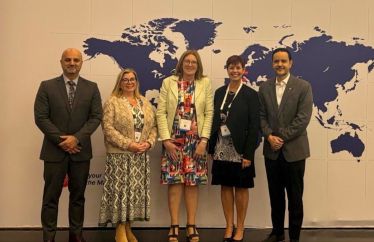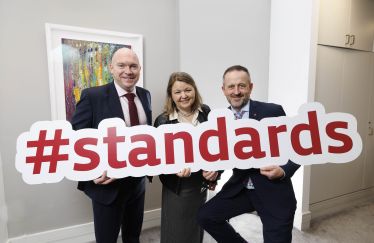- A report, “Limitations of Infrared Fever Screening” has been published by the National Metrology Laboratory (NML)
- The report highlights the limitations of using non-contact Infrared thermometers outside of a clinical setting to make a diagnosis
- NML is Ireland’s institution for the science of measurement and its associated processes, methods and instruments
24th September 2020
A new report has been issued by The National Metrology Laboratory (NML) in relation to the use of infrared temperature screening as a method of COVID-19 detection and prevention. It states that fever screening should only be used in addition to the public health advice, namely physical and social distancing, cough etiquette, handwashing and face coverings.
The report outlines the technical shortcomings of the fever screening approach which has been gaining popularity in schools, businesses and other facilities. It lists measurement errors, instrument quality and inadequate training as factors that can lead to inaccurate temperature readings.
Currently, there is no public health requirement to undertake temperature testing/screening in the workplace. However, some employers may have included provisions for temperature screening as part of their return to work measures.
NML is the National Metrology Institute for Ireland and operates as a division under the National Standards Authority of Ireland (NSAI). It is responsible for establishing, maintaining, developing and disseminating the national measurement standards for physical quantities, including temperature. The Laboratory also calibrates measuring instruments and runs proficiency tests for a range of measurement instruments like thermometers.
Dubhaltach Mac Lochlainn, a Technical Manager specialising in temperature at NML said,
“It is our view that sole reliance on temperature screening may not be an appropriate model of COVID-19 detection for schools, airports, businesses and other communal spaces. These day-to-day settings do not have the conditions needed for accurate non-contact thermal screening. HIQA have already come to this conclusion from a medical point-of-view, and our report now offers the same opinion from the measurement science perspective.”
Last month, a report from HIQA (the Health Information and Quality Authority) found that thermal screening is ineffective in limiting the spread of COVID-19, as a high temperature is not always a symptom of the virus.
Citing HIQA’s findings, NML’s report states that in addition to fever screening resulting in very low detection rates of COVID-19, factors such as the distance from the subject, angle of measurement, measurement location on the body, and varying environmental conditions can all lead to an inaccurate temperature reading.
The report maintains that the Infrared instrument and the subject being screened should be allowed 10-30 minutes to acclimatise to the setting in which testing will take place.
“The report stresses that non-contact thermal screening is supposed to be carried out by a trained professional in an appropriate clinical setting over a period of time to find temperature variations. Ultimately, taking the technology out of that setting is going to give inaccurate results and therefore shouldn’t be used to make a diagnosis of an individual,” Mr Mac Lochlainn added.
The report concludes that to avoid a false sense of security against COVID-19 infection, fever screening programmes should be implemented with an awareness of the errors associated with these measurements as well as GDPR implications.
Editor’s Notes
About the National Metrology Laboratory
The National Metrology Laboratory (NML) is the national metrology institute for Ireland and is responsible for establishing, maintaining, developing and disseminating the national measurement standards for physical quantities.
Measurement science is critical for supporting trade, underpinning innovation and providing the necessary infrastructures to protect all our citizens. It also plays an important role in ensuring that we experience economic growth in an environment where citizens are safe and protected, while at the same time meeting the demands of global challenges like climate change.
The measurement standards maintained by NML are the most accurate representations of the International System of Units (SI) available in Ireland for physical quantities of mass, length, temperature, humidity, pressure, voltage, resistance, capacitance, force, torque, frequency, time intervals and sound levels.
NML also provides training and measuring instrument calibration services.
About the National Standards Authority of Ireland
NSAI is Ireland’s official standards body. It has responsibility for providing services for standardisation, conformity assessment and measurement. Its primary aim is to improve the efficiency and performance of Irish business and enhance consumers’ confidence through standardisation.
NSAI carries out this task by developing standards, inspecting measuring instruments used in trade, conducting audits and issuing certificates on the application of standards to goods, services and measurements. NSAI provides a diverse catalogue of certification services, giving businesses and organisations the tools to demonstrate that their goods and services conform to the highest international standards.
NSAI’s services help to enable trade, protect the consumer and ensure that products and services can be relied upon nationally and across the world.
Media contact
Deirdre Farrelly, PR Account Manager
e: deirdre.farrelly@nsai.ie t: +353 86 869 0774
[Disclaimer: All reasonable effort was made to ensure that the information on this page was correct at the time of publication. Any views or opinions expressed on this page are not necessarily those of NSAI. NSAI accepts no responsibility or liability howsoever arising from the contents of this publication or any errors, inaccuracies, or omissions in the contents of the information provided therein.]



